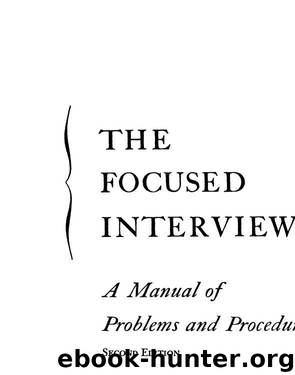The Focused Interview by Robert K. Merton

Author:Robert K. Merton
Language: eng
Format: epub
Publisher: Free Press
Functions of Depth Interviewing
When the interviewer has successfully managed this aspect of the interview, when he has obtained a substantial range of depth responses, he is better equipped to develop hypotheses relating the response to the situation. The exploration of the many-sided and deeply-rooted characteristics of responses enables the interviewer to determine the degree of detachment or of personal involvement in the experience and to evaluate the peripheral or salient character of the responses.
The degree of detachment or of personal involvement is not indicated in a summary expression of preferences. The phrase, “I didn’t like . . .” has a variety of possible meanings, none of which is disclosed by this initial designating statement. It may mean that the individual is responding as a “detached critic,” and is critically appraising the presentation of a document or the development of a social situation from a technical standpoint. He may be responding to a technically defective picture, to what he takes to be monotonous repetition, or to some other technically appraised aspect of the situation. Interesting as these detached observations may be in their own right, they are probably not so much the concern of the interviewer as are the responses which occur with some measure of personal involvement. The responses which indicate that the interviewee was in some way disturbed or otherwise affected by the content of the situation are generally of more direct interest for the interviewer. These responses may mean that the situation evoked painful anxieties and fears or that the person felt resentful of what he defines as an effort to “propagandize” him by playing upon his sentiments and values. Without appropriate elaboration of the “don’t like” response, the interviewer is confined to uncontrolled conjectures about the social or psychological implications of the response. The canon of depth directs attention to the meanings which constitute the covert significance of otherwise ambiguous or incomplete responses.
The criterion of depth also sensitizes the interviewer to variations in the saliency of responses. Some responses will be central and invested with affect, urgency, or intense feelings; others will be peripheral, of limited significance to the subject. The interviewer must elicit sufficiently detailed data to discriminate the casual expression of an opinion, which is mentioned only because the interview situation seems to call for it, from the strongly motivated response which reaches into central concerns of the informant. It appears that the atmosphere of an expressive interview allows greater opportunity for degrees of saliency to be detected than the self-ratings of intensity of belief which have lately been incorporated into questionnaires and attitude scales. But, unless the interviewer is deliberately seeking out depth responses, he may not obtain the data needed to distinguish the central from the peripheral response,
In cases in which seemingly “detached” responses occur, the interviewer often assumes that these are of only peripheral concern to the interviewee, and, therefore, that they should be by-passed in the search for more significant responses. But it cannot be assumed that seeming detachment is necessarily
Download
This site does not store any files on its server. We only index and link to content provided by other sites. Please contact the content providers to delete copyright contents if any and email us, we'll remove relevant links or contents immediately.
| Direct | Global |
| Industrial | Multilevel |
| Product Management | Research |
| Telemarketing | Web Marketing |
Influence: The Psychology of Persuasion by Robert B. Cialdini(4757)
The Miracle Morning by Hal Elrod(4698)
The Hacking of the American Mind by Robert H. Lustig(4361)
Pre-Suasion: A Revolutionary Way to Influence and Persuade by Robert Cialdini(4200)
Unlabel: Selling You Without Selling Out by Marc Ecko(3641)
Ogilvy on Advertising by David Ogilvy(3587)
Hidden Persuasion: 33 psychological influence techniques in advertising by Marc Andrews & Matthijs van Leeuwen & Rick van Baaren(3538)
Purple Cow by Seth Godin(3184)
Who Can You Trust? by Rachel Botsman(3118)
Kick Ass in College: Highest Rated "How to Study in College" Book | 77 Ninja Study Skills Tips and Career Strategies | Motivational for College Students: A Guerrilla Guide to College Success by Fox Gunnar(3108)
The Marketing Plan Handbook: Develop Big-Picture Marketing Plans for Pennies on the Dollar by Robert W. Bly(3033)
This Is Marketing by Seth Godin(3009)
I Live in the Future & Here's How It Works by Nick Bilton(2977)
The Power of Broke by Daymond John(2957)
The Tipping Point by Malcolm Gladwell(2899)
Building a StoryBrand by Donald Miller(2883)
The 46 Rules of Genius: An Innovator's Guide to Creativity (Voices That Matter) by Marty Neumeier(2831)
Draw to Win: A Crash Course on How to Lead, Sell, and Innovate With Your Visual Mind by Dan Roam(2769)
Market Wizards by Jack D. Schwager(2688)
